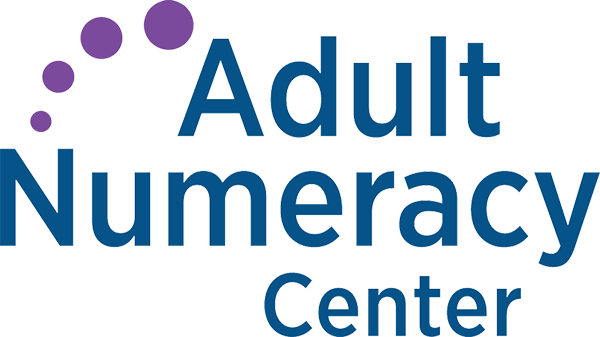What Does It Mean for Math to Be Relevant to Adult Learners?
by Melissa Braaten
When I am trying to prioritize my curriculum and to build buy-in from my students, I am always trying to think about how to make the math relevant to them. But what does relevance mean? Is it relevant for someone to learn math that they might use someday in a career they are considering? Are the specific algebraic procedures what they will use in the future, or the deeper algebraic reasoning and problem solving that they develop in the process? Is a particular math concept relevant if a student will not apply it in practice for years?
Some of the challenges faced by making math relevant involve time gaps between learning and application. In addition, research has shown[1] that the math used in careers is often specific to that career, and methods are “idiosyncratic” and learned on the job. In this article, I will describe different types of relevance that I aim for as an adult basic education math teacher when designing and prioritizing my curriculum, and which types of so-called “relevance” seem to bolster the argument that “school math” is something that real adults never use.
Immediate relevance to adult and family survival
When I think about immediate relevance, I am thinking about math that can be applied to contexts that adults are engaged in already, and in which they already have a felt need for more mathematical understanding. A few examples of this would be math that involves:
- shopping and consumer awareness (math skills: understanding percentages as used in sales and taxes, proportional reasoning to determine the best deal)
- financial literacy (math skills: basic operations for budgeting, decimals and percentages to understand banking, credit, savings, and loans)
- home and appliance use and maintenance (math skills: reading gauges, understanding measurement systems, types, and conversions to purchase and calibrate products for the home, car, etc.)
The list could go on, and will also vary a bit from person to person depending on the contexts in which they are currently operating.
This type of relevance has (in my experience) the greatest effect on student buy-in. In addition, increased numeracy skills in these areas can help families materially improve their lives. When planning a unit, I try to include at least one application which will fall into the category of immediate relevance for most of my students.
Relevance for expanding horizons
This next category will vary quite a bit from student to student. There are many applications for math (especially the math content taught at levels GLE 1-8) than can be applied immediately by most adults to improve or enrich their lives, but which may not already be a felt need because the person has not previously been engaged in that context (possibly because of lack of math skills!). An example for many of my students would be home improvement. All kinds of simple home improvement and repairs require skills of estimation, measurement, numerical reasoning, fractions and decimals, or geometric concepts of area, perimeter, and volume. I have found that many of my adult students, who often lack some of these math skills, also avoid engaging in this context. Having gotten by so far, they may not come to me with a felt need for these skills, but I am hoping the experience may actually expand the types of activities they feel comfortable exploring or engaging in.
Here are some other examples of contexts which tend to be expansions for many of my students (they can immediately apply these skills, but may not have previously thought about doing so):
- Banking and personal finance, such as comparing and opening accounts, building credit, saving for retirement, or filing taxes (math skills: numerical reasoning, positive and negative numbers, deep understanding of decimals and percentages, linear and non-linear growth)
- Making choices based on risk or probabilistic reasoning, in contexts such as medical decisions, investment choices, or even understanding weather predictions (math skills: probability concepts, ratios, data and sampling)
- Evaluating statistical and data based claims, which are often present in the news and necessary to follow policy arguments
These are just some examples. Often, the skills that tend to fall under immediate relevance are those that pertain to day to day survival, while the skills listed above may not be necessary to survive, but are certainly important for adults to fully and independently thrive and participate in society. At my current program, many of my students are legally homeless or dealing with significant economic instability, so the applications of math to expand their horizons might not feel as immediately important to them, but I want to give them the opportunity to begin to see what else is out there, and to know that they too have the ability to reason through and participate in these contexts. This is a way in which adult numeracy education can invest in long-term change in families and communities.
Timely relevance to educational next steps
Many math skills are also important for academic reasons, because they are built upon in later units or because the skills are important for a different discipline (data analysis in science, for example). Relevance to educational next steps, be it the next unit or the next level or to achieve a certain certification (high school equivalency or Accuplacer level), is an important reason to teach math concepts and should not be overlooked. Credentials matter to the job market and our students know it.
While I plan all of my units with future units, test preparedness, and interdisciplinary applications in mind, I do this with two important caveats. The first is that while this type of relevance is necessary, in adult basic education I believe it is also not sufficient to justify teaching a certain topic. There are so many topics in the College and Career Readiness Standards for Adult Education (CCRSAE) levels A-C with both immediate relevance and expanding relevance as well, that to leave out the first two does a disservice to our students. Academics for most adult students is not an end in itself but a means to a better life. Including the first two types of relevance along with preparing students for the next educational requirement allows them to start to use math to better their life now, instead of seeing the payoff always in the distant future.
The other caveat for me is that these connections must be timely. When I am planning levels and units and sequences, I would like students to apply their math skills to other academic contexts within a six-month window, whenever possible. Without timely use and retrieval, those math skills become something forgotten in one more notebook, gathering dust.
“Math I never use in real life”
When math is considered one of the most important skills for financial and career advancement in our society, how is it that so many adults (including me!) still feel that they never use much of the math they learned outside of school? How can we teach to avoid making math so “irrelevant”?
I don’t have a simple answer, but a couple of suggestions:
- Intentionally weaving in applications of math with applications of the first two types of relevance helps adults see that numeracy is something they can benefit from now and in the future.
- Advanced math with specific career applications should be taught later in the educational sequence, when students are already committed to a specific career path and are going to use the math in that career in a timelier fashion.
- Prioritizing the development of mathematical practices (such as the Standards for Mathematical Practice in the CCRS), number and operation sense, and proportional and algebraic reasoning over specific procedures.[2] These words describe thinking patterns, foundational concepts, and strategies for thinking that contribute to numeracy at every level and are relevant to any career context. Knowledge of specific procedures degrades over time if they are not used frequently, but can be easily relearned or figured out if solid mathematical reasoning is already in place.
It’s not easy to make decisions about what to teach when there is so much math and so little time. Since most adults do not learn math for its own sake but as a means to achieve other life and career goals, it is important that we teach them math that is both useful and relevant. In the process, we may even affect some long-term change in attitudes about what mathematics is all about.
————————————————————————————————————————-
[1] See National Institute for Literacy, (2010) Algebraic Thinking in Adult Education, Washington, DC. p 3. Available at https://lincs.ed.gov/publications/pdf/algebra_paper_2010V.pdf
[2] “Adults often say they have never used the algebra they learned in school. That may be true for the rote aspects of manipulating symbols, but they likely are using the mathematical reasoning and problem-solving aspects of algebra unconsciously.” From National Institute for Literacy (2010), ibid.
===================================================================
 Melissa Braaten is an adult education instructor at St. Mary’s Center for Women and Children in Dorchester, MA. Melissa has taught ASE and pre-ASE math and reading, as well as ABE writing, computer skills, and health classes. Melissa also is a training and curriculum development specialist for the SABES PD Center for Mathematics and Adult Numeracy at TERC.
Melissa Braaten is an adult education instructor at St. Mary’s Center for Women and Children in Dorchester, MA. Melissa has taught ASE and pre-ASE math and reading, as well as ABE writing, computer skills, and health classes. Melissa also is a training and curriculum development specialist for the SABES PD Center for Mathematics and Adult Numeracy at TERC.
